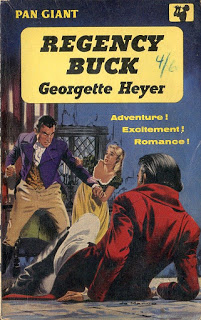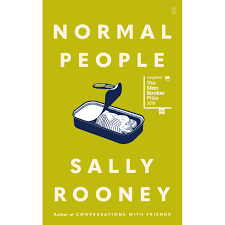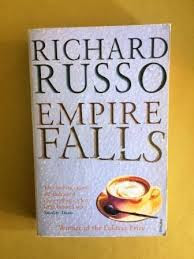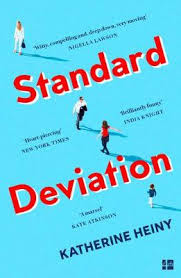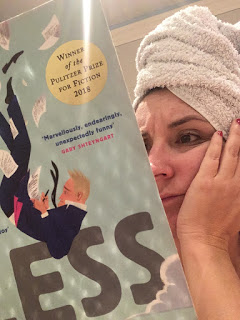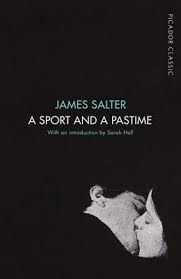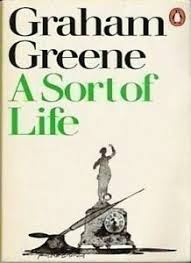
I am not quite sure why it is I like Graham Greene’s novels so much. If his novels are described – all tortured men in the mid-twentieth century – they don’t sound like something I’m going to really enjoy. Yet I really do like them, almost more than I want to. They’re drenched, all of them, in guilt and regret. This doesn’t sound very appealing, I know, but somehow I always find them very consoling. There’s some absence of judgement them, some generosity: like life’s so incredibly hard, he’s proud of you for just getting through it. It’s soothing.
A SORT OF LIFE is the first installment of his autobiography, and tells the story of his own life up to his thirties or so. It made me understand him a little better. First, for a man whose books feel so modern to me, in being so equivocal and undecided, he is older than I thought. He was born 1905, and has a childhood of illnesses – measles (twice), pleurisy, appendicitis, etc: you wonder what his parents were doing, and then remember how very modern a miracle vaccination is.
He’s miserable in school, and tells us how he used to play Russian Roulette with his brothers gun; how he cut himself; how he went to the dentist once and had a perfectly fine tooth removed just for the escape of the ether. What’s striking about all this is not so much the misery, but the way in which he tells us about it, pretty casually, and with no reference to how he obviously badly needs a ton of therapy. I guess he lived in that generation that saw both World Wars, and I can see from that perspective how you might need to do a little more than fool around with a gun before he thinks you have a real problem.
He’s happier when he goes to university at Oxford, but then he has to leave. He captures well a sentiment I think many people feel, but I have never seen written down so clearly:
Perhaps, until one starts, at the age of seventy, to live on borrowed time, no year will seem again quite so ominous as the one when formal education ends and the moment arrives for the whole future.
He finds employment at a newspaper, and then his first book is a success. This is the beginning of failure, as he tells us in his cheery fashion; he quits his day job on the back of that first success, and thereafter writes two flops in a row. He converts to Catholicism, and is much happier; but your heart breaks for him:
The first general confession, which precedes conditional baptism, and which covers the whole of a man’s previous life, is a humiliating ordeal. Later we may become hardened in the formulas of confession and skeptical about ourselves: we may only half intend to keep the promises we make, until continual failure or the circumstances of our private life finally make it impossible to make any promises at all and many of us abandon confession and communion to join the Foreign Legion of the Church and fight for a city of which we are no longer full citizens. But in the first confession a convert really believes in his own promises.
That ‘circumstances of our private life’ is very interesting. He’s married by now, and manages somehow to write a very personal memoir without telling us a thing about his wife. This is however exactly what I am gagging to know all about, as his novels are all about bad marriages and affairs that you regret. You just know that’s super juicy and that’s why he’s not telling you a thing about it.
I wouldn’t like you to think the whole thing is glum. There is lots to delight. He tells us about his dogs – his “Pekinese, passionate about dustbins;” about his fun in Sierra Leone – “I remember a glorious day in Freetown in 1942 when I closed the windows of my little office and slaughtered more than three hundred flies in a timed four minutes.” And of course the prose is lovely and lucid. Try this fabulous description of a bar, also in Freetown, but to be found all over the world:
Like the bar of the City Hotel in Freetown which I was to know years later it was the focal point of failure, a place undisturbed by ambition, a place to be resigned to, a home from home.
One interesting point about Greene was that he lived in Clapham, where I live now, and I go past his house with its blue plaque very often. I also spent quite some time in Sierra Leone, as did he. I imagine the Venn diagram of those who’ve lived off the Common and in Salone also is fairly small, and I am privileged to share it with him. I’m definitely going to order the next installment.
